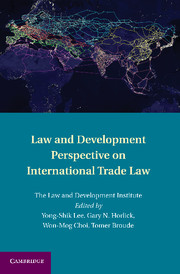Book contents
- Frontmatter
- Contents
- About the Editors and Authors
- Acknowledgments
- Law and development perspective on international trade law
- Introduction
- Part I Developing Countries and International Trade
- Part II Law and Development in the World Trade Organization
- Part III Law and Development in Free Trade Agreements
- Part IV Law and Development in Regional Initiatives
- 13 Islands of Prosperity and Poverty
- 14 Trade Preferences and Economic Growth
- 15 Economic Development of North Korea
- 16 Applying the “Specificity” Test in Countervailing Duty Cases in the Context of China's Foreign Investment Policies
- 17 Nonconclusions
- Epilogue
- Index
17 - Nonconclusions
from Part IV - Law and Development in Regional Initiatives
Published online by Cambridge University Press: 05 August 2011
- Frontmatter
- Contents
- About the Editors and Authors
- Acknowledgments
- Law and development perspective on international trade law
- Introduction
- Part I Developing Countries and International Trade
- Part II Law and Development in the World Trade Organization
- Part III Law and Development in Free Trade Agreements
- Part IV Law and Development in Regional Initiatives
- 13 Islands of Prosperity and Poverty
- 14 Trade Preferences and Economic Growth
- 15 Economic Development of North Korea
- 16 Applying the “Specificity” Test in Countervailing Duty Cases in the Context of China's Foreign Investment Policies
- 17 Nonconclusions
- Epilogue
- Index
Summary
A book on international trade law and development may strike some as brave, or even foolhardy, because there is no consensus on what “development” is, how to measure it, what causes it, or what law has to do with it. This book does not resolve those great questions but discusses in considerable detail issues that have arisen, and are likely to continue to arise, in the connection between international trade law, especially but not limited to the World Trade Organization (WTO), and development.
Trade is not an end in itself but a means to improve human welfare (as is development). Since the end of World War II, the global economic system has produced a better than 50% improvement in life expectancy in developing countries and a better than 90% reduction in maternal and infant mortality; 80% of the world’s population now has access to clean drinking water, and billions of people have been lifted out of poverty. The work is far from done — roughly 30% of the world’s population is still poor, but for the first time, there is at least reason to believe that most of those can reach a better level of welfare than they have now.
- Type
- Chapter
- Information
- Law and Development Perspective on International Trade Law , pp. 395 - 402Publisher: Cambridge University PressPrint publication year: 2011
- 3
- Cited by



